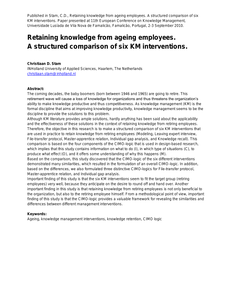This qualitative study investigates the role of coworking spaces as innovation intermediaries, focusing on a specific case study in Amsterdam. We introduce a comprehensive framework that integrates five key coworking space units and delineates three primary innovation intermediary roles: facilitation, configuring, and brokering. Our research underscores the significance of both online and offline managerial interventions that stimulate social interaction, content configuration by staff and community members, active brokering through community managers, and formal/informal events. These strategic interventions collectively enhance information flows and knowledge exchange among entrepreneurs. This study contributes valuable insights into the mechanisms through which coworking spaces facilitate innovation intermediation in support of entrepreneurial endeavours.
DOCUMENT

The coming decades, the baby boomers (born between 1946 and 1965) are going to retire. This retirement wave will cause a loss of knowledge for organizations and thus threatens the organization‟s ability to make knowledge productive and thus competitiveness. As knowledge management (KM) is the formal discipline that aims at improving knowledge productivity, knowledge management seems to be the discipline to provide the solutions to this problem. Although KM literature provides ample solutions, hardly anything has been said about the applicability and the effectiveness of these solutions in the context of retaining knowledge from retiring employees. Therefore, the objective in this research is to make a structured comparison of six KM interventions that are used in practice to retain knowledge from retiring employees (Modeling, Leaving expert interview, File-transfer protocol, Master-apprentice relation, Individual gap analysis, and Knowledge recall). This comparison is based on the four components of the CIMO-logic that is used in design-based research, which implies that this study contains information on what to do (I), in which type of situations (C), to produce what effect (O), and it offers some understanding of why this happens (M). Based on the comparison, this study discovered that the CIMO-logic of the six different interventions demonstrated many similarities, which resulted in the formulation of an overall CIMO-logic. In addition, based on the differences, we also formulated three distinctive CIMO-logics for File-transfer protocol, Master-apprentice relation, and Individual gap analysis. Important finding of this study is that the six KM interventions seem to fit the target group (retiring employees) very well, because they anticipate on the desire to round off and hand over. Another important finding in this study is that retaining knowledge from retiring employees is not only beneficial to the organization, but also to the retiring employee himself. From a methodological point of view, important finding of this study is that the CIMO-logic provides a valuable framework for revealing the similarities and differences between different management interventions.
DOCUMENT

Abstract: Background: Chronic obstructive pulmonary disease (COPD) and asthma have a high prevalence and disease burden. Blended self-management interventions, which combine eHealth with face-to-face interventions, can help reduce the disease burden. Objective: This systematic review and meta-analysis aims to examine the effectiveness of blended self-management interventions on health-related effectiveness and process outcomes for people with COPD or asthma. Methods: PubMed, Web of Science, COCHRANE Library, Emcare, and Embase were searched in December 2018 and updated in November 2020. Study quality was assessed using the Cochrane risk of bias (ROB) 2 tool and the Grading of Recommendations, Assessment, Development, and Evaluation. Results: A total of 15 COPD and 7 asthma randomized controlled trials were included in this study. The meta-analysis of COPD studies found that the blended intervention showed a small improvement in exercise capacity (standardized mean difference [SMD] 0.48; 95% CI 0.10-0.85) and a significant improvement in the quality of life (QoL; SMD 0.81; 95% CI 0.11-1.51). Blended intervention also reduced the admission rate (relative ratio [RR] 0.61; 95% CI 0.38-0.97). In the COPD systematic review, regarding the exacerbation frequency, both studies found that the intervention reduced exacerbation frequency (RR 0.38; 95% CI 0.26-0.56). A large effect was found on BMI (d=0.81; 95% CI 0.25-1.34); however, the effect was inconclusive because only 1 study was included. Regarding medication adherence, 2 of 3 studies found a moderate effect (d=0.73; 95% CI 0.50-0.96), and 1 study reported a mixed effect. Regarding self-management ability, 1 study reported a large effect (d=1.15; 95% CI 0.66-1.62), and no effect was reported in that study. No effect was found on other process outcomes. The meta-analysis of asthma studies found that blended intervention had a small improvement in lung function (SMD 0.40; 95% CI 0.18-0.62) and QoL (SMD 0.36; 95% CI 0.21-0.50) and a moderate improvement in asthma control (SMD 0.67; 95% CI 0.40-0.93). A large effect was found on BMI (d=1.42; 95% CI 0.28-2.42) and exercise capacity (d=1.50; 95% CI 0.35-2.50); however, 1 study was included per outcome. There was no effect on other outcomes. Furthermore, the majority of the 22 studies showed some concerns about the ROB, and the quality of evidence varied. Conclusions: In patients with COPD, the blended self-management interventions had mixed effects on health-related outcomes, with the strongest evidence found for exercise capacity, QoL, and admission rate. Furthermore, the review suggested that the interventions resulted in small effects on lung function and QoL and a moderate effect on asthma control in patients with asthma. There is some evidence for the effectiveness of blended self-management interventions for patients with COPD and asthma; however, more research is needed. Trial Registration: PROSPERO International Prospective Register of Systematic Reviews CRD42019119894; https://www.crd.york.ac.uk/prospero/display_record.php?RecordID=119894
DOCUMENT
